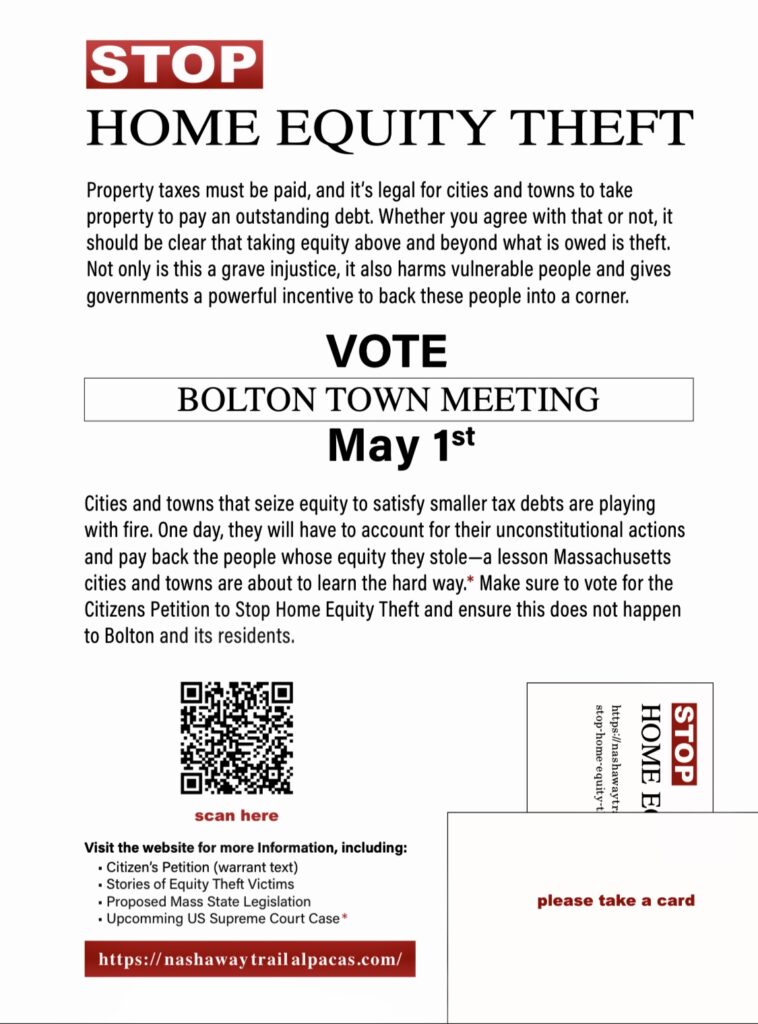The Pacific Legal Foundation filled our complaint against the town on Jan 10th
Illegal Taking – “Massachusetts Has a Problem: the Unconstitutionality of the Tax Deed”

Local governments have perverse incentives to steal your property.
Ashley Mills

There are other pending “equity theft” cases in the state and at least one in a federal court in Massachusetts, according to Frank J. Bailey, of Pioneer Public Interest Law Center.
The decision in Mills’s case, as welcome as it is, does not set a statewide precedent that is binding on other courts hearing similar cases, Bailey said. But a decision by the state Supreme Judicial Court, if a case goes before that court, would be binding, he said.
“Our hope is for an eventual SJC ruling that Chapter 60 is unconstitutional,” he said. “That would completely do away with equity theft in Massachusetts.”
An alternative to a SJC ruling would be an enactment by the state Legislature that explicitly prohibits equity takings, he said.
The ruling was a major victory for Mills’ legal team, who have been fighting across the Commonwealth for elderly and low-income residents who lost their homes after falling behind on their taxes.
“I was ecstatic,” retired Judge Frank Bailey said of the ruling. Bailey now heads the Pioneer Public Interest Law Center. “Municipalities are on message now. They’re on notice that what they’re doing is unconstitutional,” he added.
Judge finds ‘equity theft’ law unconstitutional, pressuring change (wcvb.com)
From Superior Court Judge Michael Callan:
The parties agree that Tyler v. Hennepin County, Minnesota holds that where the value of a delinquent taxpayer’s property exceeds the amount owed in taxes, interest, and fees, a statutory scheme that does not provide a procedure for the delinquent taxpayer to claim and receive the amount exceeding the amount owed violates the Fifth Amendment. See Tyler, 598 U.S. at 644-645. Cf. Nelson New York, 352 U.S. 103, 109 (1956) (holding that “City’s retention of property, in one instance, and proceeds of sale in the other, far exceeding in value the amounts due❞ did not violate takings clause of Fifth Amendment where procedure existed for homeowner to obtain surplus).
“[u]nlike in Nelson, Minnesota’s scheme provides no opportunity for the taxpayer to recover the excess value; once absolute title has transferred to the State, any excess value always remains with the State.” Tyler, 598 U.S. at 644.
The parties and this Court agree that Tyler stands for the proposition that a tax foreclosure statutory scheme that does not provide a procedure whereby a landowner may recover the value of the property in excess of the amount owed violates the takings clause of the Fifth Amendment.
Because G.L. c. 60 does not provide a procedure whereby a delinquent landowner may recover the value of his or her land above the amount owed, the retention of owners’ surplus equity when real property is taken pursuant to G.L. c. 60 to satisfy debts to municipalities violates the takings clause of art. 10 of the Massachusetts Declaration of Rights and the Fifth Amendment to the United States Constitution. The statutory scheme is not facially unconstitutional because, of course, there are circumstances where the tax debt (including interest) exceeds or equals the value of the property. It is, however, unconstitutional as applied in circumstances, such as here, where the tax debt is less than the value of the property. The statutory scheme, in its present form, is untenable and requires Legislative correction.
Accordingly, the parties are ORDERED to file with this Court respective proposed forms of Judgment in conformity with this Decision on or before April 26, 2024.
2024 Citizens Petition
What Can You do About It? Vote “YES” to End Home Equity Theft in Bolton
Bolton Voters Make Sure to Attend the Town Meeting – May 6th
See the Town Meeting Warrant Here
See the Meeting Slide Show Here
Article__: Stop Home Equity Theft
To see if the Town will vote to: Immediately stop all foreclosures on tax titles until the Massachusetts Legislature has rewritten the constitutionally infirm statute M.G.L. c. 60, §64, which authorizes “takings” in violation of the Fifth Amendment of the U.S. Constitution. To avoid ongoing litigation costs and to resolve any previous tax title foreclosures currently in dispute the Town shall engage in mediation and negotiate settlements ASAP. Furthermore the Town shall avoid the necessity of foreclosing and use of the power of sale, by authorizing reasonable repayment agreements, not employing §215-2 of the bylaws but instead facilitating the permitting required for sale at fair market value of the smallest undivided portion of the parcel(s) prior to foreclosure. If necessary the Town shall recoup delinquent taxes and collection costs by power of sale returning to the owner any surplus above the taxes, interest and charges of keeping and sale per M.G.L. c. 60 § 43 and M.G.L. c. 60 §28. If after an unavoidable foreclosure, but prior to a public sale, the Town desires to retain a tax title property for Town Purposes it shall authorize such according to MGL Chapter 40, section 14 and Chapter 44, section 7.
Summary:
On May 25, 2023 The U.S. Supreme Court’s unanimous decision in Tyler v. Hennepin County, 143 S.Ct. 1369 (2023), declared that tax schemes like the one in Massachusetts are unconstitutional. The Land Court tells us that under the U. S. Constitution, property owners will be owed compensation from a tax foreclosure—if the property taken by the government is worth more than the tax debt owed. The Massachusetts Attorney General has warned that to avoid an unconstitutional taking, any excess funds recovered or excess value must be provided to the original property owner. In addition municipalities will be held liable for legal costs in any ongoing State and Federal actions necessary to recoup the equity. This article provides an alternative, working with property owners to create reasonable repayment agreements, and allow the permitting necessary to sell at full and fair market value, avoiding the need for a public auction sale. If the Town wishes to retain a foreclosed tax property it will follow the same procedure as it would to acquire any other property and will come before Town Meeting and receive the necessary 2/3 vote as any other expenditure to acquire real estate would. This article is in keeping with the proposed State Legislation S. 921 and H. 2937. All references available at https://nashawaytrailalpacas.com/stop-home-equity-theft
See all the Legal Citations for the above Citizens Petition
If you want to learn more and possibly say a few words at Town Meeting in support of this article please email: 110teeleroad@gmail.com
Consider sending a Letter to the Editor of our local paper the Bolton Independent
We are looking to have multiple people second this Citizen’s Petition – Once the Article is “moved” feel free to shout out “Second”
Paula Recco – Land Court

Stop Home Equity Theft – Nashaway Trail Alpacas
The court held a hearing on the motions on Thursday, April 18, 2024 at 2:00 P.M. in person at the Suffolk County Courthouse.
The court will issue an order on the motions for judgment on the pleadings if the defendant has not redeemed the property by April 29, 2024.
The Carmen Nancy Rodriguez Story
Tallage Bought Nancy’s Tax Title
Tallage Foreclosed and Tried to Evict Nancy
She lost her home over $2600 in back taxes how a landmark court case could give it back
In this case, Nancy lost title to her home and had to file a bankruptcy case. Under bankruptcy law, where a person loses an asset because of fraud, they are entitled to get it back. One type of fraud can be established if the company that takes the asset fails to pay “reasonably equivalent value.” Here, Nancy argues that her home was transferred to Tallage for a payment of approximately $3,700 — far from fair value.
On March 15, Chief Judge Elizabeth Katz of the U.S. Bankruptcy Court for Massachusetts denied a Tallage motion that would have allowed the company to evict Nancy from her decades-long home. – Telegram & Gazette
Then Tyler Dropped May 25th and Tallage Moved to Vacate June 29th
To allow Ms. Rodriguez to proceed with reorganization under the spirit of the Bankruptcy Code, Tallage Davis now requests that the Land Court vacate the Judgment of foreclosure, so that the Property may be administered under the Bankruptcy Code as part of the Bankruptcy Estate. The Bankruptcy Court has, today, issued an order allowing Tallage Davis to proceed with a request to Vacate the Judgment. See Order in Chapter 13 Case No. 23-40040 dated June 29, 2023 – Motion to Vacate
Post Tyler Update
Interested in getting an update on how the town is handling Farmer’s case in light of Tyler!!
What is happening in Massachusetts in light of the Supreme Court ruling on Tyler in May??
Doggon It
Doggon It, What’s Going On? Find Out …….. Continue reading “Doggon It”
TOWN MEETING WARRANT
The Meeting Warrant is available on line (you will get a paper copy next week in your USPS mailbox)
Click to access 2023_atm_warrant_final.pdf
Doug will be holding a discussion of the articles April 24 in the Houghton Building I assume it will be at 7pm. (good luck trying to find an anoucement about it on the town’s website)
Article 13 is the citizens petition
SCOTUS will hear the issue on the 26th
Since only 5 people came out on Monday click below if you’d like to see the Candidates Night
Happy Easter

Summit Series
| No. | Name of Hill | Conservation Area | Start Description |
| 1 | Watttaquadock Hill* | Welch Pond | Welch Pond Trail Head, Wattaquadock Hill Rd. |
| 2 | North Peak | Vaughn Hills | Moen Parking Area, Vaughn Hill Rd. |
| 3 | Peach Hill** | Fyfeshire | Fyfeshire Gate, Wattaquadock Hill Rd. |
| 4 | Powder House Hill | Powder House | Town Common, Main St. |
| 5 | Rattlesnake Hill | Rattlesnake | Lime Kiln Trail Head, Main St. |
| 6 | Barrett’s Hill | Danforth | Danforth Trail Head, Danforth Ln. |
| 7 | Long Hill*** | Annie Moore | Annie Moore Trailhead, Bolton Woods Way |




